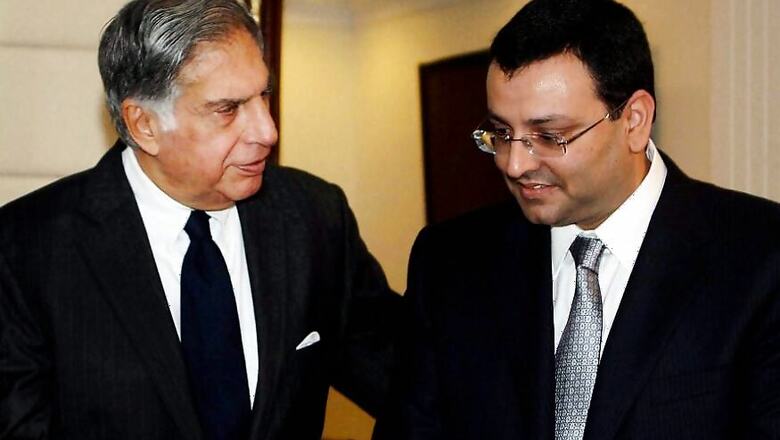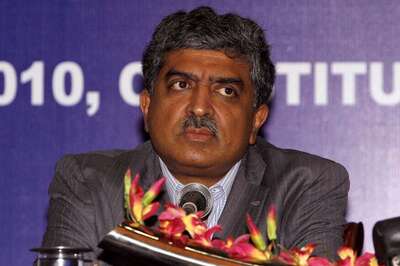
views
When Tata Sons set up a committee to consider a star-studded list of Indian and international business executives in a bid to find a replacement for Ratan Tata as chairman of the company, one among the five members of the selection panel was Cyrus Mistry.
However, in an intriguing turn of events, he later dropped out and joined the aspirant pool. In November 2011, Mistry was made deputy chairman of the Tata Group, with the explicit goal of taking over as chairman a year later, upon the retirement of Ratan Tata, who had headed the conglomerate since 1991. He took over the top post in 2012, the first in the company's history not to be a blood relative of the Tata family.
Mistry, 51, is the younger son of construction tycoon Pallonji Shapoorji Mistry who, valued at $14.4 billion, is the richest Irish person in the world. Pallonji has an over 18 per cent stake in Tata Sons, the holding company of Tata Group, making him the single largest shareholder in India’s largest private conglomerate.
Mistry is married to Rohika Chagla, the daughter of lawyer Iqbal Chagla. His elder brother, Shapoor Mistry, is married to Behroze Sethna, the daughter of lawyer Rusi Sethna. His sisters, Laila and Aloo are married to Rustom Jehangir and Noel Tata, the half-brother of Ratan Tata, respectively.
Apart from being the chairman of Tata Sons till October 2016, when he was sacked by the company under controversial circumstances, Mistry is the scion of the Parsi family that owns Shapoorji Pallonji Construction Limited, Forbes Textiles and Eureka Forbes Limited. The family also owns a stake in the iconic Taj Mahal Hotel in Mumbai.
According to media reports, the Mistry family's property interests include a White House-style mansion on an exclusive seaside stretch in Mumbai, a 200-acre stud farm in Pune, an imposing residence in Surrey, as well as homes in London and Dubai.
Cyrus P Mistry joined the board of Shapoorji Pallonji & Co Ltd as director in 1991 and was appointed the managing director of Shapoorji Pallonji Group in 1994. He is a graduate of civil engineering from Imperial College, UK (1990) and has a master’s degree in management from London Business School (1997).
Under Mistry’s guidance, Shapoorji Pallonji's construction business grew manifold. The companies evolved from pure construction to executing projects under design and build and EPC delivery methodologies, implementing complex projects in the marine, oil and gas, rail sectors.
Under Mistry's stewardship, the companies registered many firsts in India —construction of the tallest residential towers, the longest rail bridge, the largest dry dock and the largest affordable housing project. The Economist, in a 2013 article, categorised Mistry as “the most important industrialist in both India and Britain”.
Cyrus was responsible for building the infrastructure development vertical in the Shapoorji Pallonji Group starting in 1995 with a 106 MW power project in Tamil Nadu followed by the development of the India’s largest biotech park near Hyderabad in partnership with the Andhra Pradesh government.
The infrastructure vertical also developed large road projects. Shapoorji Pallonji Group’s foray into agriculture and biofuels was also overseen by him. He resigned from the company upon being made deputy chairman of the Tata Group.
Mistry joined the board of Tata Sons on September 1, 2006, a year after his father retired from it. He served as a director of Tata Elxsi Limited, from September 24, 1990 to October 26, 2009 and was a director of Tata Power Co Ltd until September 18, 2006.
After Ratan Tata stepped down, he was appointed the chairman of Tata Sons. In addition, he was also chairman of all major Tata companies including Tata Industries, Tata Steel, Tata Motors, Tata Consultancy Services, Tata Power, Tata Teleservices, Indian Hotels, Tata Global Beverages and Tata Chemicals. The Tata Sons board voted to remove him from the chairmanship of the company on October 24, 2016. However, the National Company Law Appellate Tribunal (NCLAT) on Wednesday restored Mistry as Tata Sons chairman, giving four weeks to the company to implement its order.
(With agency inputs)




















Comments
0 comment